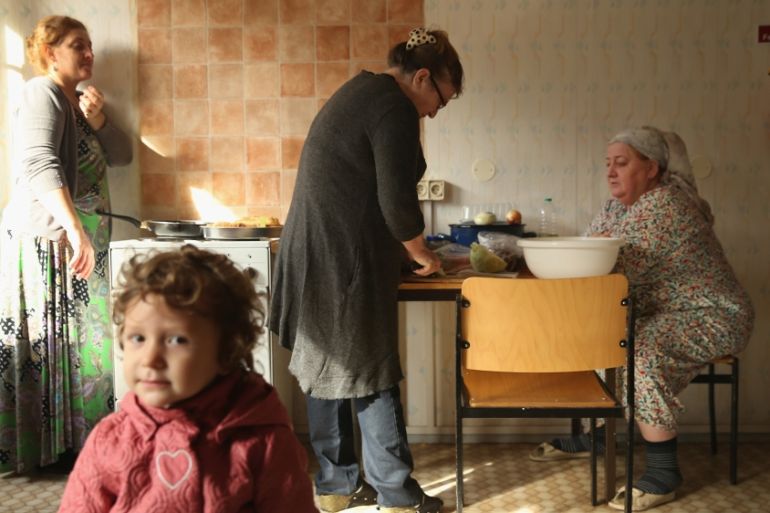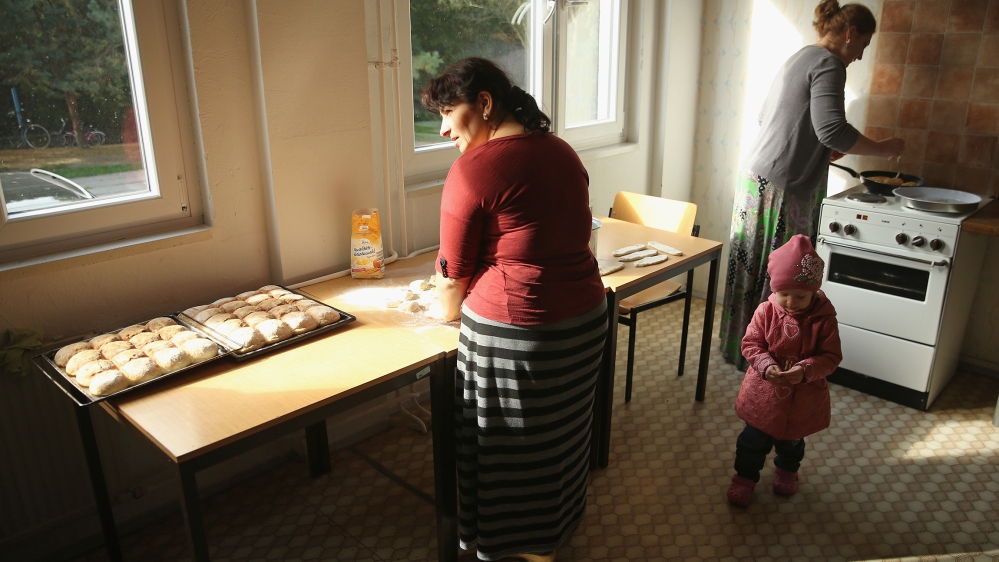Chechen community in Germany fears social rejection, deportation
About 50,000 Chechens live in Germany and as some struggle to fit in, others simply fight for their right to stay.

Berlin, Germany – Soon after Zelimkhan Dokudaev arrived in Berlin in 2008, he got to work on projects to help integrate the Chechen diaspora with German society.
“I saw the conditions Chechens were living in here, how many problems they had.
“Not only the physical conditions, but the atmosphere – the views people had of Chechens. I wanted to change this, and to help them adapt.”
These days, he runs the German-North Caucasian Social and Cultural Center.
“We don’t have our own space yet, but this works for now,” he says, gesturing to an office his organisation uses three times a week in Berlin’s Wedding district. “We’re still new, after all.”
He founded the group in June, bringing together expatriates from the North Caucasus living in Berlin and Brandenburg, hoping to help in their journey into the German way of life.
Attendees hail from the full spectrum of North Caucasus republics, but most, like Dokudaev himself, are Chechen.
The centre holds cultural and social activities, including language lessons and classes teaching lezginka, the traditional Chechen folk dance.
But their most important service is integrating migrants, especially new arrivals.
It can be hard for Chechens to prove their persecution at home, at least on the level the German migration service demands. This has gotten more difficult after 2016, with rising anti-migrant sentiment in the country.
There are about 50,000 Chechens currently living in Germany.
The first arrivals came over 20 years ago, during the First Chechen War (1994-1996), but a steady stream has continued as more than 100 Chechens attempt to enter the European Union from Belarus every day.
The vast majority are seeking asylum, escaping persecution by Chechen authorities who allegedly employ collective punishment against entire families.
According to Dokudaev, there are some cultural barriers that prevent cohesion in Germany.
He recently advised a couple who were in a dispute with a local kindergarten. They wanted their differently aged children to be in separate classes – something common in Chechnya, but not in Germany – but the nursery refused.
“The father was very upset. I spent a whole day talking with them, explaining that this is just how things are in Germany, and you have to follow the rules,” Dokudaev says. “It may seem like a small problem, but this kind of thing is at the heart of everything.”
The German government also provides services aimed at aiding integration. But these have come with their own challenges.
“The government has classes, but these are all taught by Russian-speaking workers. Many Chechens who come here can only speak Chechen fluently,” Dokudaev says. “Even if they can, they often find it very difficult to ask for help. They feel it’s shameful, for a Chechen man to be helpless.”
These issues are reflected in the perception of Chechens in official circles.
“I would say that Chechens have more difficulty with the authorities [than other migrants],” says Guido Steinberg, a senior associate with the German Institute for International and Security Affairs. “Distrust towards them is more pronounced than other communities.”
This is likely part of the reason why a number of Chechens have no official status in Germany and are vulnerable to the threat of deportation.
“There was one situation with a disabled man, literally last week,” says Dokudaev.
“He was in a wheelchair, and meanwhile his wife had to get surgery. While she was in the operation, they deported him to Poland, saying he didn’t have status.”
EU member states are entitled to deport migrants back to the first EU country they entered and almost all Chechens enter via Poland.
“He calls me all day, asking, ‘Zelimkhan, help me, what’s going on?’ He can’t even stand up. Polish authorities won’t help him.”
I just hope that Germans will finally pay attention to the Chechens here, and their problems.
Having welcomed more than a million refugees and migrants since 2015, xenophobia is on the rise in Germany.
“It can be hard [for Chechens] to prove their persecution at home, at least on the level the German migration service demands,” says Steinberg. “This has gotten more difficult after 2016, with rising anti-migrant sentiment in the country.”
Polish camps are not the only destination for deportees.
Chechens are regularly sent back to Russia, despite regular warnings from human rights groups that they will not be safe there.
For those who have been outspoken against Ramzan Kadyrov, the Russian-installed leader of Chechnya, arrest, torture, or worse often awaits.
One known critic, Azamat Bayduev, disappeared within hours of arriving in Chechnya, having been deported from Poland last August.
Amnesty International said there “could hardly be a better illustration of why it is not safe to return Chechen refugees to Russia.”
This makes avoiding deportation the main priority of many Chechens in Germany.
Most decide to leave Chechnya after facing persecution from authorities, invoked on the often baseless claim that a member of their family is involved with an “armed terrorist group”.
They make their way via bus or train to Belarus, where they attempt to enter Poland, and thus the EU.
They are often refused for arbitrary reasons, such as not having a visa – in breach of international asylum laws. Some families make dozens of attempts, their financial resources slowly dwindling, until they are forced to return home, where sometimes they are never heard from again.
Even for those who make it past Poland, their status in Germany is not much better.
Chechen refugees usually only hold a duldung – a “temporary suspension of deportation” document that ensures that they will be removed from the country at an unspecified point in the future. In this environment, where expulsion can occur at any time, rumours and desperation abound.
To overcome this, one common approach among Chechens is to split up the family.
“There’s a belief [among Chechen migrants] that if the whole family is not together, you will probably not be deported,” says Dokudaev.
“What happens is that the wife and children sleep at the shelter, while the man of the family goes somewhere else. If he can’t find anywhere, he sleeps on the street.”

Despite all this, there are glimmers of hope. Some Chechen migrants do end up leading happy lives.
“The most successful Chechens tend to be those who just keep their head down, don’t make political statements, and focus on learning the language [German],” said a Chechen consultant in Germany, speaking on condition of anonymity.
“There are of course many, many Chechens here who still want to see an independent Chechnya, and they think that because they are in Germany, they can now say whatever they want.
“But drawing too much attention to yourself like this is the easiest way to experience problems,” he added, claiming that “Russia will get annoyed and ask for you to be returned, and their relations with Germany are good, so [the Germans] will often agree.”
For Dokudaev, the journey to turn his community’s fortunes around continues.
“I just hope that Germans will finally pay attention to the Chechens here, and their problems,” he says. “That they will help people, and that they will help me help them. Continuing to ignore it won’t make it go away.”